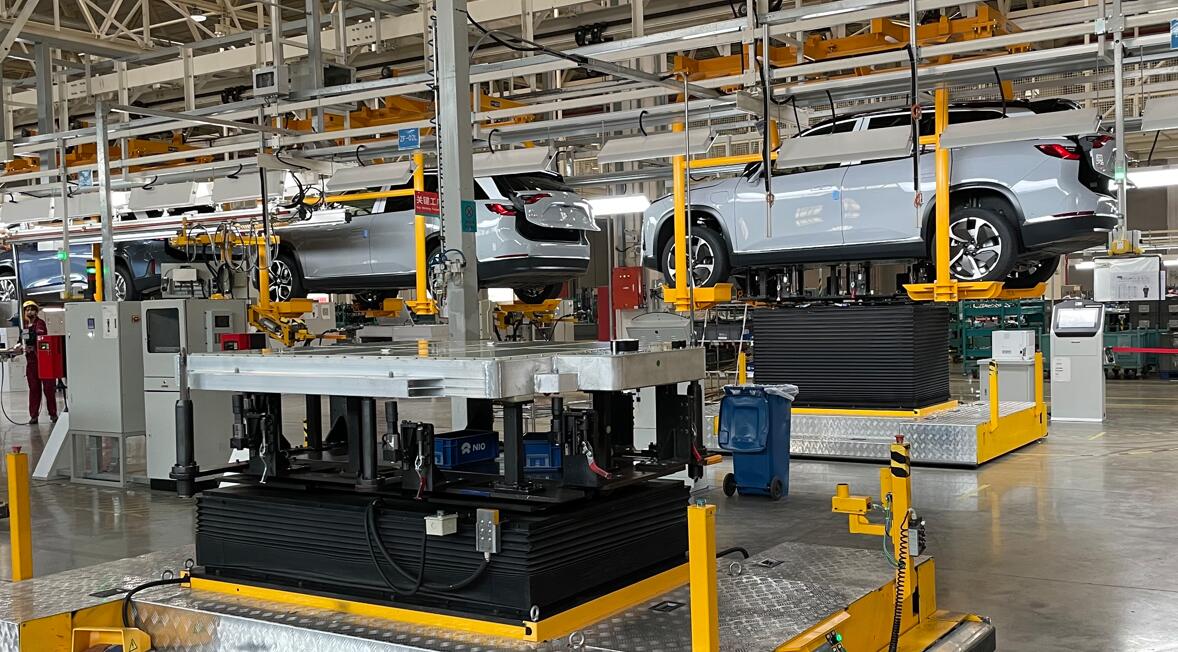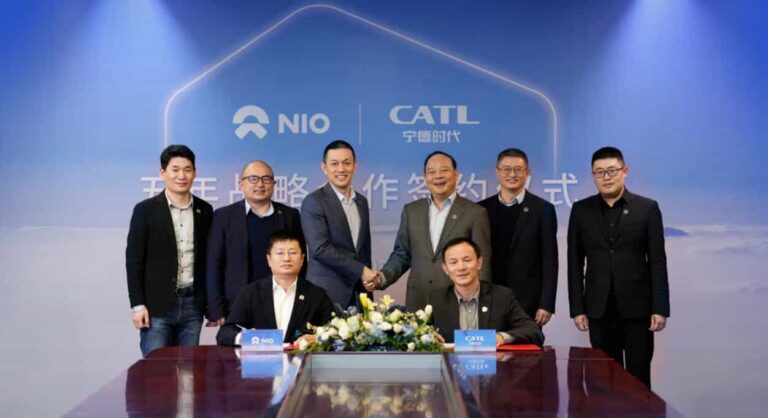The program is only available to a few strategic customers, including Nio, Li Auto, Huawei and Zeekr, and Tesla is not included, according to local media.
(Image credit: CnEVPost)
CATL is reportedly offering significantly lower battery costs to a handful of electric vehicle (EV) makers, including Nio (NYSE: NIO), in an effort to maintain core customer loyalty.
The Chinese power battery giant is recently pushing a lithium rebate program to automakers to drive down battery purchasing costs for a handful of customers, according to a report today by local media outlet 36kr.
The program is not aimed at all customers, but rather at several strategic clients including Nio, Li Auto (NASDAQ: LI), Huawei and Zeekr, the report cited sources as saying.
The core terms of the partnership include that CATL will settle a portion of the price of power supply with automakers based on a price of RMB 200,000 per ton of lithium carbonate for the next three years.
At the same time, automakers signing the partnership will be required to commit about 80 percent of their battery purchases to CATL, according to the report.
Currently, battery-grade lithium carbonate is quoted at about RMB 470,000 per ton, and car companies that can purchase batteries at a cost of RMB 200,000 a ton will undoubtedly be able to significantly reduce cost pressures, the report noted.
These customers are mainly companies that CATL believes will have good deliveries in China, and Tesla is not among them, the source said.
The program will be implemented starting in the third quarter, and some car companies are already in the process of signing the cooperation, according to the report.
CATL, meanwhile, has asked its upstream suppliers for a price cut of about 10 percent.
Some material suppliers say CATL has rarely pushed for such a large price cut before because it the battery giant's high gross margins.
That will make it challenging for other battery makers, and second- and third-tier battery makers are responding, according to the report.
Svolt Energy, which became independent from Great Wall Motor, has also launched a 10 percent price cut, and some suppliers have received emails from the battery maker asking to comply with the price cut, the report said, citing industry sources.
As the world's largest power battery maker, it is quite rare for CATL to initiate a price cut program.
Last year, as battery material prices, including lithium carbonate, rose sharply, CATL began implementing a mechanism to tie battery prices to raw material prices.
After battery material prices rose 40 percent, the price of batteries CATL provides to car companies also rose 40 percent, 36kr said, citing a source familiar with the matter.
In contrast, CATL's smaller competitors didn't let car companies bear the entire increase in battery costs, but bore some of it themselves, according to the report.
The 40 percent battery price hike has put a lot of pressure on car companies and made them more crisis conscious about the supply of power batteries, the report said, adding that companies including Nio and Li Auto have either started developing batteries themselves or are determined to bring in a second or even third battery supplier.
CATL felt the pressure, especially in the second half of last year, and it began to reflect on some business strategies, the report said, citing several industry sources.
Nio
For Nio, it signed a five-year strategic cooperation agreement with CATL on January 17 at the battery giant's headquarters in Ningde, Fujian province.
The agreement is another deepening and upgrading of their strategic partnership based on technology cooperation involving new brands, new projects and new markets, the press releases from CATL and Nio said at the time.
Their releases did not provide details of the collaboration, and it's unclear if it involves what 36kr reported today. But it's worth noting that the signing ceremony was witnessed by a executives including CATL founder, chairman and CEO Robin Zeng, and Nio founder, chairman and CEO William Li, which shows the importance of the partnership.
In 2021, Nio was the second largest customer of CATL after Tesla. All Nio models currently on sale use battery packs from CATL.
In a conference call on June 9, 2022, following the announcement of Nio's first-quarter earnings, Li confirmed that the company will develop its own batteries.
Nio has a battery team of more than 400 people to research areas including battery materials, cells and battery management systems to fully establish battery system development and industrialization capabilities, he said at the time.
The company will put into production its new battery pack in 2024, which will support 800V high-voltage fast charging, according to Li.
In addition to developing its own batteries, Nio also appears to be starting to bring in battery suppliers other than CATL in the past few months.
Previous regulatory filings show that Nio has been bringing in CATL's smaller rival CALB as a new supplier, starting with the two new models EC7 and the new ES8 launched late last year.
To date, the battery suppliers on the regulatory filing pages for the new EC6, EC7, new ES8, and new ES6 all include CATL as well as CALB.
Li Auto
When Li Auto launched its first five-seat SUV, the Li L7, on February 8, it announced that it was introducing a new battery supplier other than CATL.
In addition to the previously mentioned Pro and Max versions, Li Auto also announced a lower-priced Air version for the Li L7, and the Li L8 will also receive an Air version.
With the launch of the Air vagrants, Li Auto introduced battery suppliers other than CATL -- Sunwoda Electric Vehicle Battery (Sunwoda EVB) and Svolt Energy -- to its supply system for the first time.
Both battery manufacturers have set up dedicated production lines for Li Auto to produce the carmaker's own battery packs, Li Auto said at the time.
The Li L7 Air will be powered by batteries supplied by Svolt Energy, while the Li L8 Air will use Sunwoda's batteries.
The performance, quality and warranty policies of the Air versions of the Li L7 and Li L8 are consistent with those of the Pro and Max versions, Li Auto said.
There was no previous signal that Li Auto would bring in a battery supplier other than CATL. However, it is worth noting that in early November, there were media reports that CATL had signed a number of restrictive terms with the car companies it partnered with in order to maintain its position as the industry's number one.
In its partnership with Li Auto, CATL restricted the company from choosing other battery suppliers, and if violated, CATL stopped supplying, according to these reports.
On November 4, Securities Daily cited CATL's response that the reports were untrue. Li Auto also said at the time that the company's cooperation with CATL was deepening and that the media reports were false rumors.
Xpeng
The 36kr report makes no mention of Xpeng, which switched its main battery supplier last year to a company other than CATL.
After Xpeng officially launched the G9 SUV on September 21, 2022, an executive said CATL was no longer the company's largest battery supplier, but did not disclose who the new primary supplier was.
Xpeng also said at the time it was working with Sunwoda to develop a fast-charging battery for the G9 that would allow the model to reach 80 percent charge in 15 minutes.
On September 23, CALB said it had a custom battery product solution for the Xpeng G9, and the launch of the model signaled a further deepening of the strategic partnership between the two companies.
Previously, CALB had been the preferred supplier for the Xpeng P7 and P5 sedans, and the company also supplied the G3i, at one point supplying 83 percent of that model in 2022, the battery maker said at the time.
That statement implied that CALB may have replaced CATL as Xpeng's main supplier at that time.
On October 20, 2022, Svolt Energy announced that the cell modules it supplied to the Xpeng P5 sedan, officially rolled off the line in large volumes.
This means that Xpeng has introduced Svolt Energy as a new supplier.
Xpeng was the third largest customer of CATL after Tesla and Nio in terms of battery installations in 2021, according to Gaogong Industry Institute.

